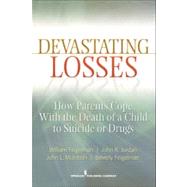Devastating Losses: How Parents Cope with the Death of a Child to Suicide or Drugs
, by Feigelman, William- ISBN: 9780826107466 | 082610746X
- Cover: Paperback
- Copyright: 6/1/2012
This volume fills a critical gap in our scientific understanding of the grief response of parents who have lost a child to traumatic death and the psychotherapeutic strategies that best facilitate healing. It is based on the results of the largest study ever conducted of parents surviving a child's traumatic death or suicide. The book was conceived by William and Beverly Feigelman following their own devastating loss of a son, and written from the perspective of their experiences as both suicide-survivor support group participants and facilitators. It intertwines data, insight, and critical learning gathered from research with the voices of the 574 survivors who participated in the study. The text emphasizes the sociological underpinnings of survivor's grief and provides data that vividly documents the critical need for emotional support from family members, coworkers, and friends. It explains how bereavement difficulties can be exacerbated by failure of significant others to provide expected support, while membership in peer support groups and the long-term connections often made there greatly facilitate the healing process. The argument that various types of stigmatization complicate and prolong grieving is well documented. The book also focuses on the unique bereavement difficulties of parent survivors of drug overdose deaths and compares the stigmatization of these parents with that of survivors of other traumatic losses. Also explored are the ways in which couples adapt to the traumatic loss of a child and how this can bring them closer or render their relationship irreparable.Key Features: Offers researchers, clinicians, and parent-survivors current information on how parents adapt after the traumatic loss of a childPresents data culled from the largest survey ever conducted (574 individuals) of parents surviving a child's suicide or other traumatic deathInvestigates the ways in which stigmatization complicates and prolongs the grieving processAddresses the tremendous value of support groups in the healing processExplores how married couples are affected by the traumatic loss of their childIdentifies the needs for mental health services among longer-term survivors






